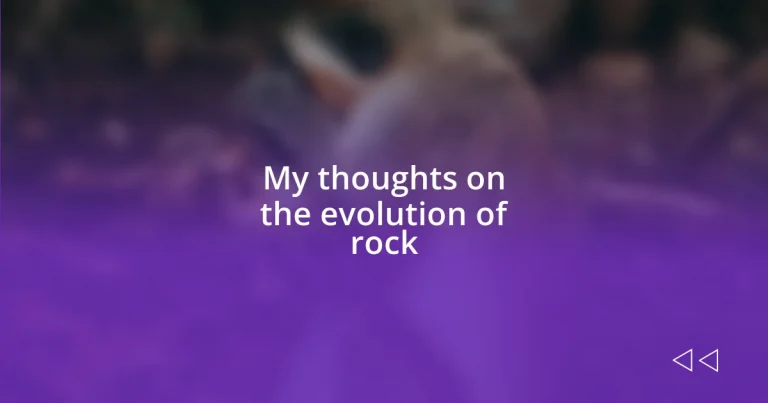Key takeaways:
- Rock music’s evolution began in the 1950s, blending various styles and driving cultural change, highlighted by the British Invasion of the ’60s.
- Key genres like punk, grunge, and alternative rock emerged in response to societal norms, with artists using music as a voice for rebellion and authenticity.
- Technological advancements have transformed music production, consumption, and live performances, making rock more accessible and immersive for fans.
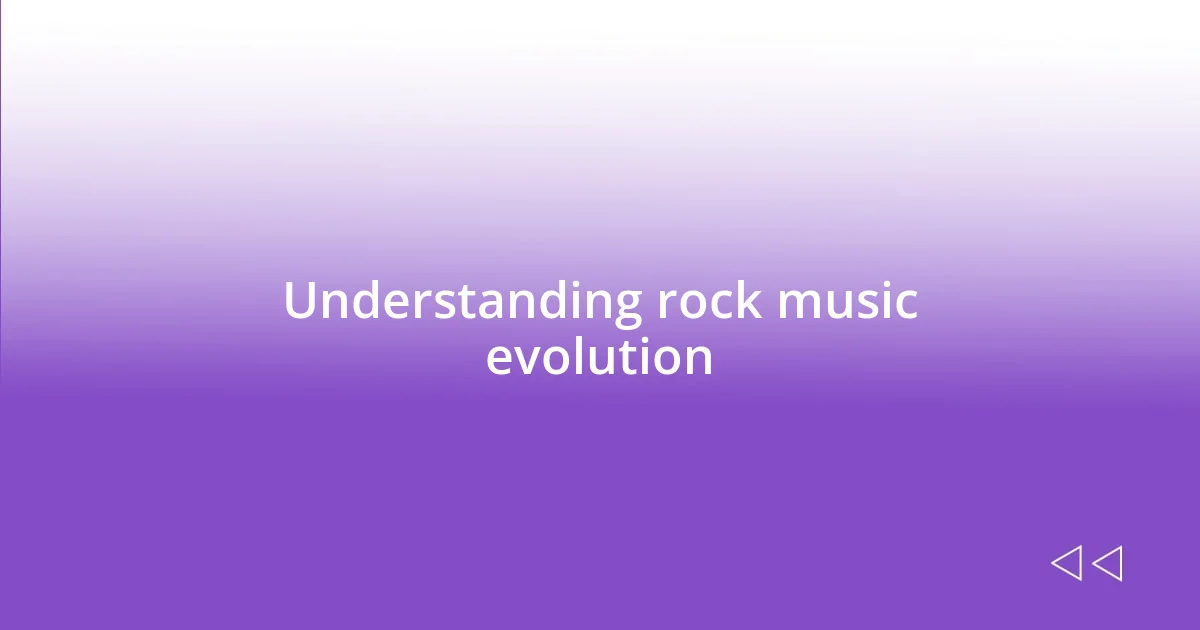
Understanding rock music evolution
Rock music is like a living organism, continuously evolving and adapting to the cultural shifts and societal changes around it. I remember my first time hearing a classic rock song on the radio—it struck a chord deep within me, making me curious about the roots of this incredible genre. Isn’t it fascinating to think how rock began in the ’50s, blending rhythm and blues with country influences, and has journeyed through so many unique phases since then?
As I explored the history, I found that each decade brought its own flair to rock music. The ’60s unleashed the British Invasion, which transformed rock into a global phenomenon. I still recall the electric energy of a live concert I attended, where I felt the crowd pulsing as one, a clear reminder of how rock has the power to unite us across generations. What’s your favorite era of rock, and how do you think it reflects the times?
Transitioning into punk, grunge, and alternative rock, I’ve noticed how artists began to challenge societal norms through their music. This authenticity resonates deeply with listeners, don’t you think? For me, these genres were catalysts for both personal and cultural rebellions, showcasing that rock isn’t just about the sound—it’s a voice for change. Rock music’s evolution is a testament to its enduring spirit, continually inspiring and provoking thought across diverse audiences.
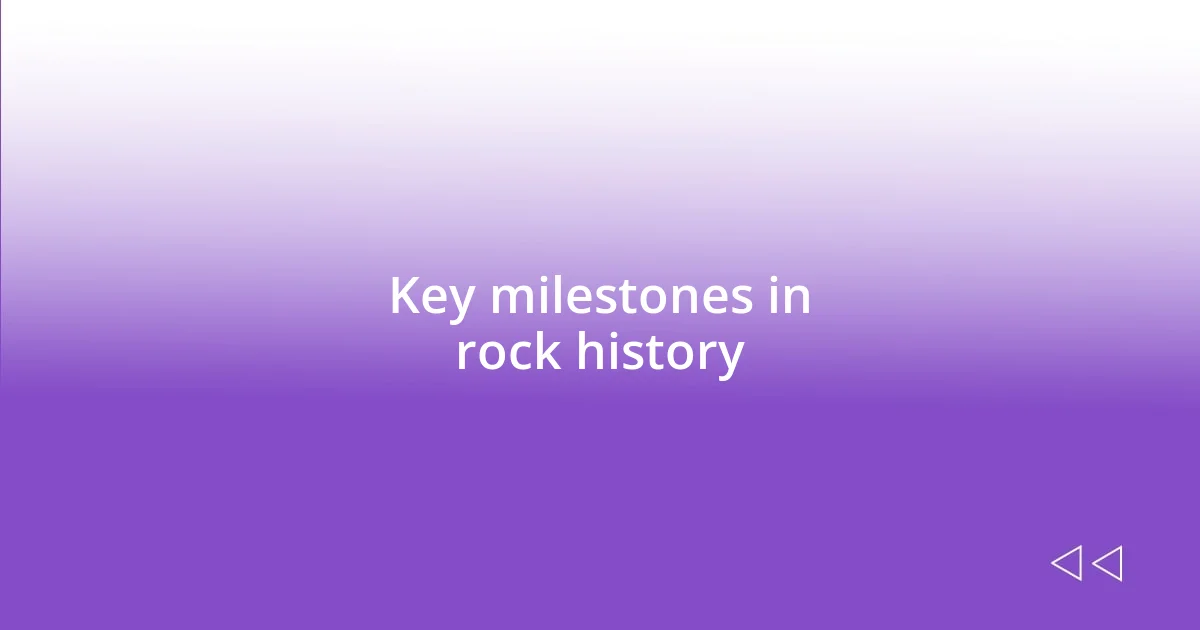
Key milestones in rock history
The emergence of rock music in the 1950s marked a transformative moment in music history. Artists like Chuck Berry and Elvis Presley took the stage, blending various musical styles that introduced an energetic, rebellious spirit. I remember listening to “Johnny B. Goode” for the first time—it felt like a spark igniting my passion for music and history. It’s incredible how that energy paved the way for future genres.
Fast forward to the psychedelic ’60s, where bands like The Beatles and The Rolling Stones reshaped the rock landscape. Their innovative sounds and iconic performances not only captivated audiences but also created a cultural revolution. I often think back to how a friend’s vinyl collection transported me back in time, allowing me to live those moments vicariously. The impact they had on art, fashion, and politics cannot be overstated; it feels like they birthed a new consciousness.
The rise of grunge in the ’90s brought a raw authenticity that impacted a generation. Bands like Nirvana and Pearl Jam challenged the polished aesthetics of the ’80s hair metal. I vividly recall driving down the highway with “Smells Like Teen Spirit” blasting through the speakers—the angst and emotion resonated with my own struggles as a teenager. It’s a powerful reminder that music can articulate feelings we sometimes can’t express ourselves.
| Milestone | Key Artist/Band |
|---|---|
| 1950s Rock N Roll | Chuck Berry, Elvis Presley |
| 1960s British Invasion | The Beatles, The Rolling Stones |
| 1990s Grunge | Nirvana, Pearl Jam |
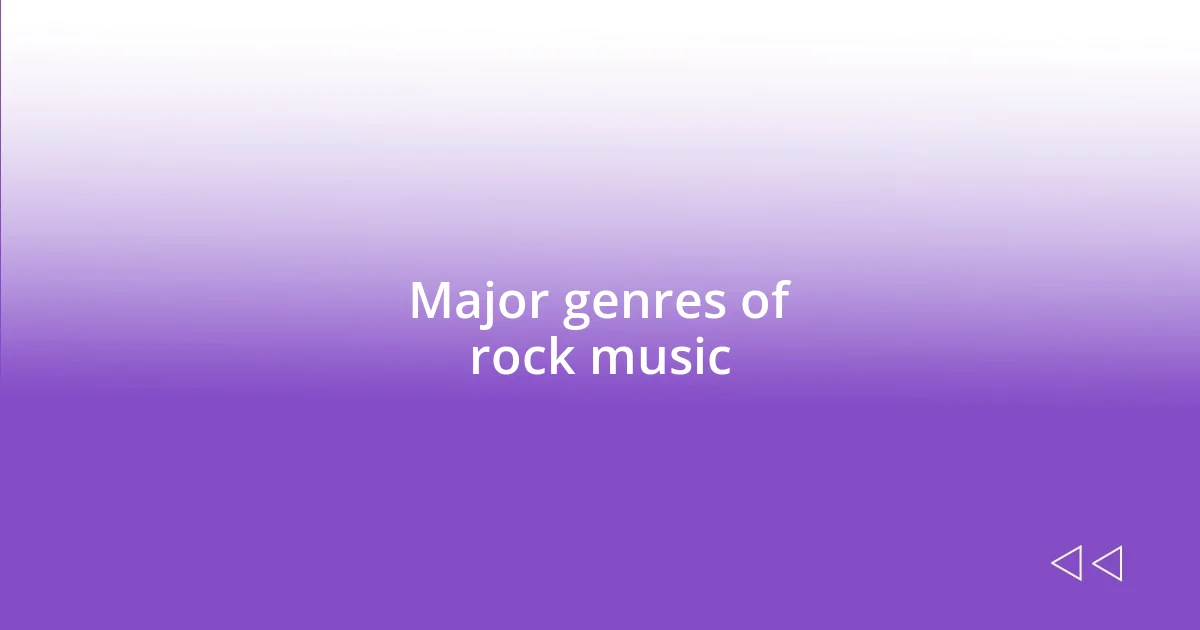
Major genres of rock music
Rock music branches into various major genres, each characterized by unique styles and cultural influences. I find it intriguing how these genres not only reflect the music itself but also the societal situations at their peaks. For instance, I remember hearing punk rock for the first time—bands like The Ramones and The Sex Pistols encapsulated feelings of rebellion and discontent. It was invigorating to sense that rush of energy through their music, a liberating experience that has stuck with me ever since.
Here’s a closer look at some key rock genres that have influenced the landscape:
- Classic Rock: Grounded in the ’60s and ’70s, featuring iconic bands like Led Zeppelin and The Who.
- Punk Rock: Defined by its raw edge and anti-establishment ethos, with bands like The Clash leading the charge in the late ’70s.
- Alternative Rock: Emerging in the ’80s and gaining prominence in the ’90s, showcasing bands like Radiohead and R.E.M. that pushed musical boundaries.
- Grunge: A ’90s phenomenon, marked by bands like Soundgarden and Nirvana, bringing angst and authenticity to the forefront.
- Metal: Often heavy and aggressive, bands like Metallica and Black Sabbath explore darker themes.
Each genre speaks to different emotional landscapes, providing a soundtrack to our lives. I can’t help but feel a deep connection with the lyrics of some of these songs—they often encapsulate the frustrations and triumphs of everyday life, almost like a comforting friend I can turn to.
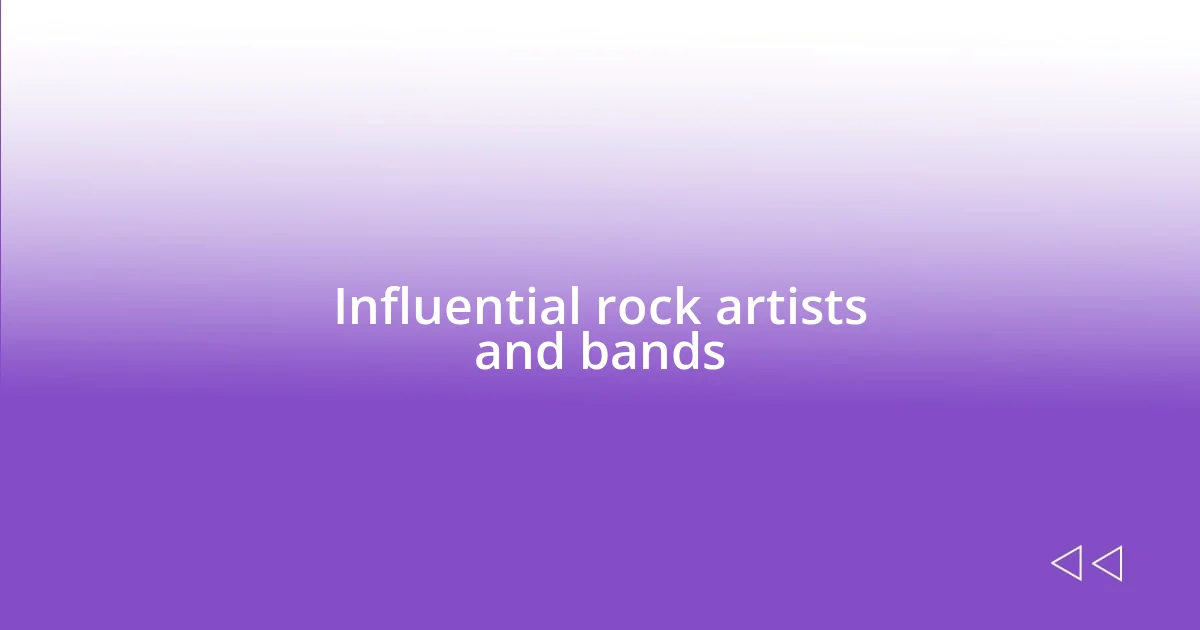
Influential rock artists and bands
When I think about influential rock artists, it’s impossible not to mention Jimi Hendrix. His innovative guitar playing and showmanship changed the game forever. I remember the first time I heard “Purple Haze”—it felt like a revelation, a sonic adventure that transported me. This experience helped me appreciate how one artist can redefine what we think is possible in music.
Similarly, I can’t overlook the impact of Queen. Their fusion of rock with theatricality brought a new dimension to the genre. Listening to “Bohemian Rhapsody” for the first time was overwhelming; it was like an emotional rollercoaster encapsulated in one song. Each time I hear it, I’m reminded of the power of creativity and how it inspires us to embrace our individuality.
Then there’s the modern influence of Foo Fighters and the way they’ve kept rock alive in recent years. Their hard-hitting sound feels familiar but refreshingly contemporary. I recall attending one of their concerts—being surrounded by a sea of fans, all singing in unison. It struck me how rock music continues to forge connections, weaving people together through shared experiences and passion.
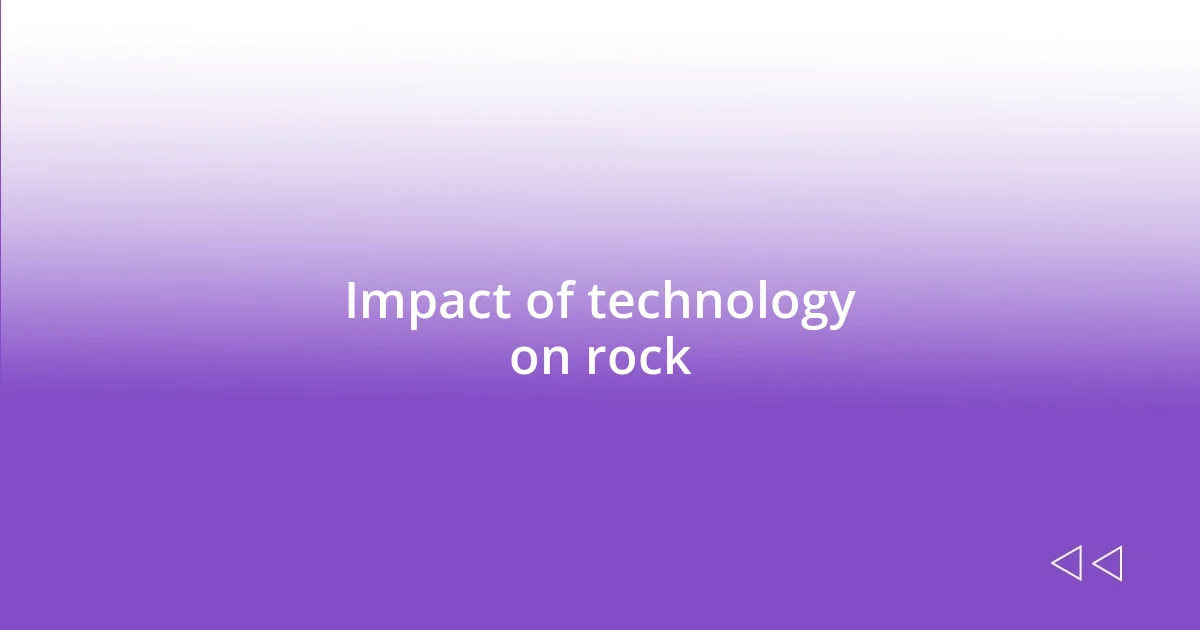
Impact of technology on rock
Technology has dramatically reshaped the landscape of rock music, from recording to performance. I recall the first time I dove into the world of digital recording; the clarity and depth I could achieve with just a few clicks were mind-blowing. Bands now can experiment with sounds and layers that were simply unattainable for many artists in the past. Just think—how different would classic albums like The Beatles’ “Sgt. Pepper’s” be if they had access to today’s technology?
The way we consume rock music has also changed, significantly influencing how artists reach their audience. Streaming platforms have democratized music distribution, making it easier for emerging bands to showcase their work without the traditional gatekeepers. I remember discovering a lesser-known band on social media, getting lost in their sound, and feeling a part of their journey as they grew. It’s exhilarating and gives us, the fans, a direct line to the music we love.
Moreover, live performances have been transformed through advancements like high-quality sound systems and visual effects. I experienced this firsthand at a concert where the lighting and sound were so immersive that it felt like the band was speaking directly to my soul. Modern technology not only enhances the performance but fosters a deeper emotional connection between artists and fans. How can we ignore the impact of these innovations on our experiences with rock music?
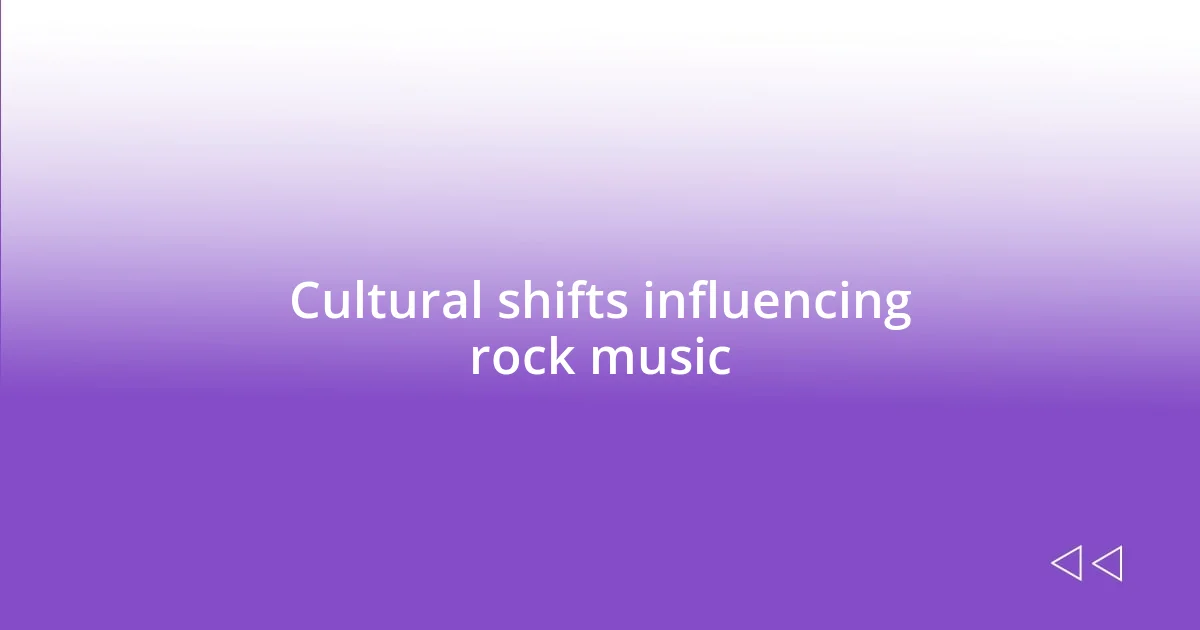
Cultural shifts influencing rock music
Cultural shifts have always played a crucial role in the evolution of rock music, reflecting the society in which it exists. I think about the counterculture movements of the ‘60s and ‘70s, where rock became an anthem for change. When I hear songs like “Fortunate Son” by Creedence Clearwater Revival, I’m transported back to a time when young people passionately opposed the Vietnam War. It’s fascinating to see how social issues shaped the lyrics and themes of countless tracks.
As rock music moved into the ’80s and ’90s, the rise of grunge brought forth a shift in cultural attitudes towards authenticity and vulnerability. Bands like Nirvana captured the angst of a generation feeling disillusioned and disconnected. I remember listening to “Smells Like Teen Spirit” on repeat—it felt raw and unfiltered, eliciting this sense of understanding in a world that seemed superficial. Isn’t it amazing how music can encapsulate such complex emotions and connect deeply with listeners?
Today, as we dive into the realm of social media and global connectivity, rock music continues to evolve. I often find myself following underground artists online who are breaking boundaries, mixing genres, and challenging societal norms. It’s a thrilling time, as the cultural landscape influences rock into new territories. How exciting is it to think that the next wave of rock might reflect issues we can’t even imagine right now? This ongoing dialogue between culture and music is what keeps the genre vibrant and relevant.
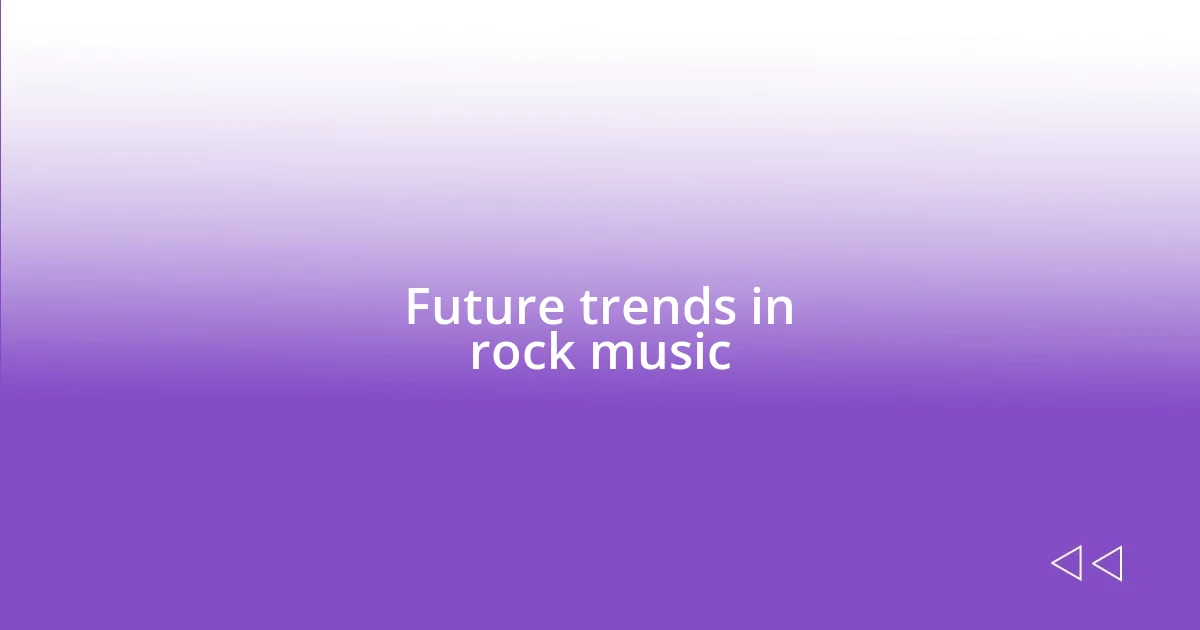
Future trends in rock music
As we look ahead, I can’t help but feel optimistic about the fusion of rock with other genres. Collaborations between rock musicians and artists from hip-hop or electronic music present thrilling possibilities. I remember the first time I heard Post Malone’s “Rockstar”—the seamless blend of rock energy with modern beats was refreshing. Isn’t it fascinating how these cross-genre experiments may redefine what we perceive as rock music?
Another trend I foresee is the increasing emphasis on environmental and social consciousness within rock lyrics. With movements like climate activism gaining momentum, I can imagine bands channeling these urgent messages into their music. Picture a new anthem echoing the sentiments of a generation advocating for change; it could resonate as powerfully as the protest songs of the past. How profound would it be for rock to become a voice for the planet, not just another genre?
Finally, I believe virtual reality (VR) experiences could transform how we enjoy live rock shows. Just think about it: attending a concert from your living room, feeling like you’re in the front row, surrounded by your favorite band and fellow fans. I sometimes wonder if we’ll find ourselves connecting with artists in entirely new ways, forging experiences that feel incredibly vivid and deeply personal. What if this new dimension of live music actually brings us closer to the artists we admire? The future of rock certainly holds intriguing possibilities!












